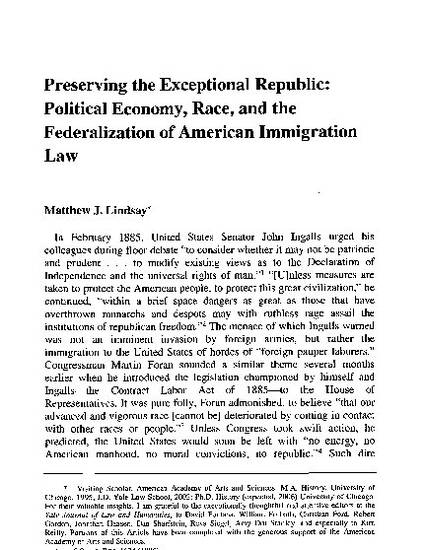
In February 1885, United States Senator John Ingalls urged his colleagues during floor debate "to consider whether it may not be patriotic and prudent . . . to modify existing views as to the Declaration of Independence and the universal rights of man."[U]nless measures are taken to protect the American people, to protect this great civilization," he continued, "within a brief space dangers as great as those that have overthrown monarchs and despots may with ruthless rage assail the institutions of republican freedom." The menace of which Ingalls warned was not an imminent invasion by foreign armies, but rather the immigration to the United States of hordes of "foreign pauper laborers." Congressman Martin Foran sounded a similar theme several months earlier when he introduced the legislation championed by himself and Ingalls - the Contract Labor Act of 1885 - to the House of Representatives. It was pure folly, Foran admonished, to believe "that our advanced and vigorous race [cannot be] deteriorated by coming in contact with other races or people." Unless Congress took swift action, he predicted, the United States would soon be left with "no energy, no American manhood, no moral convictions, no republic." Such dire exhortations must have struck a chord, for the Contract Labor Act passed both houses of Congress by an overwhelming majority. The Act prohibited the admission into the United States of European immigrants who set sail from their homelands after having entered into a labor contract with an American employer.
Even as its sponsors insisted that the Act was essential to the preservation of American political values and institutions, both proponents and opponents of the legislation, within Congress and without, acknowledged that it contradicted two cardinal tenets of the nation's republican faith-first, the United States' historic liberality toward immigrants, rooted in Americans' confidence in the power of an open continent and free institutions to assimilate all comers; and second, the Gilded-Age understanding of the wage contract as the hallmark of economic freedom and personal independence. Yet Congress countenanced these apparent contradictions because, it concluded, a great number of European immigrants were irredeemably unfit - economically, politically, and, most significantly, racially - for inclusion within the American polity. This Article explains why patriotic republicans across the political spectrum joined in this "modification" of the nation's founding principles, and how a class of immigrants that less than a generation earlier had been widely celebrated as the lifeblood of the nation came to be viewed as a menace to American institutions.
Available at: http://works.bepress.com/matthew-lindsay/8/
